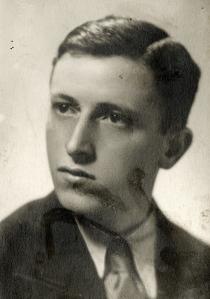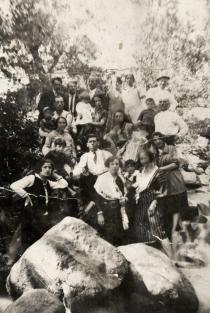Raina Blumenfeld's family
This is a family photo taken in the 1930s. From left to right: my brother Israel Sabitai, my mother Sarina Sabitai, our housemaid, my father's younger sister Esther Primo, and Sofi, my father's brother Sabath Sabitai's wife. In the front are my younger sister Ziumbiula, me, Sofi and Sabath's two children, Juliet and Benjamen, and my elder sister Rebecca.
I and my two sisters are dressed in velvet dresses of the same fabric, sewn by a dressmaker. Since clothing costs were high, my mother urged my sister Rebecca to learn sewing during vacations from a very early age - as soon as she finished 4th grade - in order to save spending money at a dressmaker.
My elder sister studied at the Jewish school until 4th grade. When my time to go to school came, my parents sent me to a Bulgarian school for reasons I never knew; therefore, I didn't study Hebrew. I went to a nursery school before going to the Vassil Levski school at Dimitar Petkov Street where I studied until 4th grade. Then I went to an elementary school at Pirotska Street. My most favorite subject was chemistry. Later on, I was interested in astronomy and read a number of books on astronomy, which I borrowed from libraries. I was greatly impressed by the fact that the most luminous star on the horizon was not Venus, but Sirius - the constellation Canis Major.
My brother completed his primary education at a Jewish school. I remember that my brother was very keen on studying and took a book to read even when sitting at the table for his meals. My mother called him 'daliado' in Ladino, which means absent-minded, because books never left his hands. His grades at school were high enough to release him from matriculation but, nevertheless he, of his own free will, sat for the exams in order to improve his grades even more.
When I was a child I knew a lot of games, which are not played nowadays. Boys and girls used to play The King-Gateman. This game wasn't only known by the Jewish population in Sofia. Two boys hold each other's hands above their heads to make a gate. All the others line up in a queue and pass between them, singing: 'King-and-Gateman! Open the gates and let the King's army pass through! Open, close, leave only one man!' When the last word is sung, the two boys, through whose 'gate' the others pass, suddenly drop their hands and catch somebody. The last one to remain takes the place of one of 'gate-boys' and so everything is repeated on and on. We also used to play a men's game, 'jelick', we would dig a hole, put a piece of wood on top of it and with another piece of wood had to throw it out as far as possible.






































